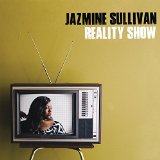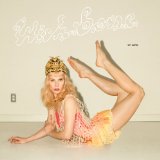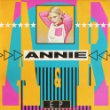 Jazmine Sullivan’s third album comes after a five-year break and follows a period of personal turmoil and subsequent self-discovery for the big-lunged Philly r’n’b singer. “Reality Show” may suggest something both toe-curlingly revealing and tackily brash but Sullivan’s elegant but charged timbre and monologues couldn’t be further from this. There is also some fun to be had to here though, more than might possibly be expected given the reason for Sullivan’s break, and a distinct cohesiveness throughout which given the scattershot of styles chosen is quite an accomplishment. And this is an album that Sullivan has invested heavily in; co-producing, writing and selecting material that reflect her choices as an artist returning to the game where even a year out can result in negative speculation.
Jazmine Sullivan’s third album comes after a five-year break and follows a period of personal turmoil and subsequent self-discovery for the big-lunged Philly r’n’b singer. “Reality Show” may suggest something both toe-curlingly revealing and tackily brash but Sullivan’s elegant but charged timbre and monologues couldn’t be further from this. There is also some fun to be had to here though, more than might possibly be expected given the reason for Sullivan’s break, and a distinct cohesiveness throughout which given the scattershot of styles chosen is quite an accomplishment. And this is an album that Sullivan has invested heavily in; co-producing, writing and selecting material that reflect her choices as an artist returning to the game where even a year out can result in negative speculation.
“Dumb” is the smart, albeit misleading, opener and first single of “Reality Show”. Smart because it immediately reconnects to the Sullivan sound of 2008’s, Grammy-nominated “Bust Your Windows”; it’s operatic, audacious and built around that mesmerising pure soul voice. It’s also a very good song and sounds very much of its time. Misleading in the sense that it doesn’t reflect the rest of the album, at least sonically. It makes its point, sets the scene before retreating to allow for more subtle and unexpected sounds.
“Mascara” is one of a triptych of songs that have a sixties girl group sentiment and sound. The most contemporary sounding of the three, “Mascara” is a lyrically ambiguous song that at first seems to be a ‘make the best of yourself’ ode to faking it when you’re actually breaking down a little inside. A closer listen confirms that Sullivan has adopted the persona of a defensive, insecure woman who hates other women and would do anything to keep hold of her partner, whatever the compromise in her dignity. It’s smart and buoyant and proves Sullivan can trip up a complacent listener. “Stupid Girl” is a juddering, snare rolling retro track that brings to mind Mark Ronson’s more playful Amy Winehouse productions and the relentless Motown thwack of “If You Dare” sends Sullivan soaring above a positive-thinking anthem that has genuine energy and power.
“Silver Lining” is a glorious, airy late seventies r’n’b style mid-tempo track where vocally Sullivan conveys desperation, optimism and indifference over three minutes so effortlessly that it’s hard to avoid comparisons to the truly great soul vocalists from the past four decades. “#HoodLove” also has moments where it’s possible to believe that Aretha Franklin herself has made a hard – nosed but ultimately romantically blind-sighted (‘he aint always right, but he’s just right for me’) ghetto tribute. “Masterpiece (Mona Lisa)”, an ode to self-acceptance, takes its sonic cues from eighties Quincy Jones balladry and the electro-disco of the brilliant and inspired “Stanley”, an obvious highlight here, features a surprising sample of Annie’s Scandi-pop hit “Greatest Hit” of all things. A put upon girlfriend, Sullivan urges her feckless Stanley to wake up, smell the roses and ‘take a bitch to dinner!’
At a time when female r’n’b is confidently stepping out of the rut it tended to find itself in during the EDM days of the early 2010s and could indeed be heading for another renaissance period, Jazmine Sullivan has made an album which sounds reassuringly timeless in spite of its various retro influences. Although there are still many detailed and modern sonic flourishes here, the spotlight, as might be expected, falls on Sullivan’s exceptional vocal abilities and for the best part, the songs are more than good enough to support her talent. There may be little here that is ground-breaking but Reality Show has little use for trick photography or fashionable gimmicks. Jazmine Sullivan is a shocking scene stealer and is wonderfully showcased here on what may well be her most thought out and intriguing album.
 Nottingham-based Ronika has fashioned her debut album, named after the now closed record shop that stocked her essential loves and obsessions, after three crucial but somewhat lesser known albums made in the early part of the 1980s. Shannon’s “Let The Music Play”, Gwen Guthrie’s “Portrait” and, to a lesser extent, Cristina’s “Doll in the Box”. That’s electro-pop, disco, freestyle and boogie with some arch knowingness thrown in for the hell of it. American dance music made at a time of racial and sexual revolutions; soul music to linger in between the wink and kiss-off attitude, when people danced like it would save their lives. Ronika seems to get this relationship intrinsically and her album is one that also has a slightly unhinged quality which cements a clear persona and her mix of the old and new is wonderfully realised and, when it’s at its strongest, still fresh sounding.
Nottingham-based Ronika has fashioned her debut album, named after the now closed record shop that stocked her essential loves and obsessions, after three crucial but somewhat lesser known albums made in the early part of the 1980s. Shannon’s “Let The Music Play”, Gwen Guthrie’s “Portrait” and, to a lesser extent, Cristina’s “Doll in the Box”. That’s electro-pop, disco, freestyle and boogie with some arch knowingness thrown in for the hell of it. American dance music made at a time of racial and sexual revolutions; soul music to linger in between the wink and kiss-off attitude, when people danced like it would save their lives. Ronika seems to get this relationship intrinsically and her album is one that also has a slightly unhinged quality which cements a clear persona and her mix of the old and new is wonderfully realised and, when it’s at its strongest, still fresh sounding.
Recorded over a four-year period, “Selectadisc” features some material already heard on Ronika’s previously-released and well-received EPs and it’s some of the best music here. “In the City” is a fantastic song, a smoothly rolling ode to metropolitan night-time living; it gets under your skin and under your feet and is the kind of record that should have been huge and at one time would have been. “Video Collection”, “What’s in your Bag” and “Forget Yourself” are reminiscent of a Tom Tom Club/Gwen Stefani type of camp pop and are all essential. The two duets with Charles Washington, “Clock” and “Paper Scissors Stone” show a more experimental showy side and “1000 Nights” trips itself up only because it is very nearly a facsimile of Shannon’s tensely terrific “Give Me Tonight” and even then it’s still enjoyable enough. Ronika’s voice has occasional flashes of very early Teena Marie soulfulness but is smoother and less dramatic; make no mistake she can sing and comparisons to an early Madonna, at least vocally, sell her short.
With her arresting, canny and playful image Ronika falls into a category of idiosyncratic women who adore and emulate different forms of dance pop and understand the aesthetic of late eighties MTV. She is in good company with the likes of Annie, Roisin Murphy and the newly refreshed Kyla La Grange and displays an ability to write songs that are not only instant but those which also develop into lifelong soundscapes that accompany moments of invaluable dance-floor escapism. All of the really important dance music has done this, whatever the sub-genre and “Selectadisc” has a high count of great songs and a fun but involved groove grounding the majority. Ronika will be around for some time, it appears; her devotion to making and performing music seems inescapable and is irresistible. The UK dance scene – if such a thing still really exists – should welcome her with open arms.
 Since recording her occasionally twee, but consistently charming self- titled debut from 2011, Danish electronic pop singer-songwriter Oh Land has been listening to a lot of rap and the influences of this genre can be heard all over the tight and tough follow up,” Wishbone”. The stark, attention-seeking cover portrait alone projects enough star power to confirm that Nanna Ohland Fabricius means business this time; just try not to stare at it. Along with the recruitment of David Sitek, TV on the Radio member and fast becoming the most inspired alt-pop producer to emerge after the last couple of years (Beck, Beady Eye, Yeah Yeah Yeahs and CSS), the promise of something both unexpected and immediately compelling is met almost without exception.
Since recording her occasionally twee, but consistently charming self- titled debut from 2011, Danish electronic pop singer-songwriter Oh Land has been listening to a lot of rap and the influences of this genre can be heard all over the tight and tough follow up,” Wishbone”. The stark, attention-seeking cover portrait alone projects enough star power to confirm that Nanna Ohland Fabricius means business this time; just try not to stare at it. Along with the recruitment of David Sitek, TV on the Radio member and fast becoming the most inspired alt-pop producer to emerge after the last couple of years (Beck, Beady Eye, Yeah Yeah Yeahs and CSS), the promise of something both unexpected and immediately compelling is met almost without exception.
“Wishbone” is Oh Land’s declaration of change and of the strength required to achieve it. Many of the songs use fighting or violent metaphors to get the message across, but are then off set against lush, warm restorative retreats. Album opener “Bird in An Aeroplane” is a strange, weary-sounding minor key, synth pile-up; it’s also a very good pop song but not fully realised on first listen. Like some of Sitek’s other productions, the fun is unravelling and exposing a song’s real intentions, which can sometimes take time. At the other end of the spectrum, “Renaissance Girls” furiously changes the tone with its scatty mania and staccato melody, Oh Land dazzling with exuberant vocals. It’s one of the most self-possessed pop songs of the year.
“Love a Man Dead”, “Kill My Darling” and, in particular, “My Boxer”, which sees Oh Land reunite with producer Dan Carey (MIA, Bat For Lashes and Kylie), form a trilogy of sorts of part-rapped, part-sung concise muscular electro pop tracks. David Sitek again changing musical tack with “Pyromaniac” which is loose and funky and with its celebratory woo-hoo’s is The Cardigan’s classic “Lovefool”’s older sister. The twinkling “Sleepy Town” and doomy, two note piano chime of “Next Summer “(‘Put me to sleep and don’t wake me up, until time has changed please let’s fast forward the clock’), both topped with deceptively sweet vocals, successfully take the theme of small town resentment and boredom into mid tempo territory along with the finger snapping r’n’b of “Cherry On Top”.
“Green Card” is a majestic, rolling Sia co-write and is a success of proportion and restraint; trumpets swell and Oh Land’s elaborate vocals demonstrate the skill and versatility of her vision and talent. The wheezy and dilapidated electronics on album closer “First to Say Goodnight” mimic more than anywhere else here the overall sonic atmosphere of Sitek’s successful collaboration with Scarlett Johansson on her album of Tom Waits covers “Anywhere I Lay My Head”. Where Johansson’s voice was never much more than a remote smudge or drawl, Oh Land’s clear and intimate vocals pull you much closer to the sentiment and sound beautiful alongside the ornate, drunken musicbox soundtrack.
Robyn, Lykke Li, Dragonette and Annie make vivid, revered and, to many, cultish pop music of various shades. Oh Land, like several similar acts, has been on the periphery of this greatness for a little while now but “Wishbone” sees her nudge her way into this very special group with an album that, in addition to cementing her own unique identity, is a delirious and thoughtful collection of pop beauty.
 Annie is the absolute embodiment of a cult artist but also a bit of an oxymoron, she shows few signs of craving that big crossover pop smash although she appears to be the most archetypal of pop stars, but then not quite. Annie has always retained an awkwardness and appears as an introverted figure; with no massive ego and zero tabloid splashes, this is not the kind of attitude that will get you that support slot on the next Katy Perry stadium tour. This EP is not going to change that and an assumption that this was never one of Annie’s main objectives in the first place would not be naïve.
Annie is the absolute embodiment of a cult artist but also a bit of an oxymoron, she shows few signs of craving that big crossover pop smash although she appears to be the most archetypal of pop stars, but then not quite. Annie has always retained an awkwardness and appears as an introverted figure; with no massive ego and zero tabloid splashes, this is not the kind of attitude that will get you that support slot on the next Katy Perry stadium tour. This EP is not going to change that and an assumption that this was never one of Annie’s main objectives in the first place would not be naïve.
Like fellow swede Robyn before her, Annie isn’t releasing an album this time round, apparently there will be three EP’s this year, each made with a different producer/come collaborator (“Tube Stops and Lonely Hearts”, which suddenly appeared as a lone single earlier this year, was co-produced by Girls Aloud masterminds Xenomania) and the first is with anarchic pop producer and neglected genius, Richard X (the R in the title). Richard X is to Annie as Timberland once was to Missy around the turn of the last decade, the relationship goes beyond that of muse and maestro, an equal partnership that brings out the best in each artist derived from a comfort factor and desire to innovate.
These are songs about relationships with boys, or should I say men, Annie is in her thirties after all. The third track, and maybe the most pure pop moment here, is a cartoony, Casio keyboard style bleeped love letter addressed to one man in particular. “Ralph Macchio”, the actor best known for his role as the Karate Kid, is Annie’s new crush and the humour that is a trademark of Richard and Annie’s previous work is in intact and resplendent (2004’s “Me Plus One” is famously about Geri Halliwell pleading with Richard X to work with her and the cut-price diva consequences of him refusing). “Invisible”, with its Funky Drummer sample and acid squiggles, make it the most textured and interesting track the duo have come up with to date. A duet with herself, Annie’s voice is slowed down for a verse as she acts out the part of the rotten lover and then answers herself with a Boo style rap; it goes hard and is fantastic.
“Hold On” is possibly the standout song; it’s certainly the most self-assured and has some lovely, intricate musical details from Richard X (listen out for the brief, clipped steel drum sample right at the end) and a mid-tempo groove that manages to reference The Rah Band, “Break 4 Love” and St Etienne while Annie’s delicate vocals float above the whole thing beautifully. “Mixed Emotions” is sad, minor key verse major key chorus disco house which doesn’t make its presence felt as strongly as the other three tracks and “Back Together”, a co-write with Sally Shapiro obsessive (it shows) Little Boots, is straight-up pop house from 1991 although many will be too blind to see it.
Annie fans will be happy then, her and Richard X have turned their obsessive musical radar to the dance (and chart) music of the early 1990’s and particularly with “Invisible” and “Holding On”, have created tracks that would have doubtlessly appeared on The Chart Show, the frustrating but loved music video show that ran throughout the decade. These songs are neither big or stupid enough to make that kind of mainstream impact now but the world is a different place, one where Annie can get her smart and fun tunes out to her dedicated demographic and still remain pop’s best kept secret. Her choice.


